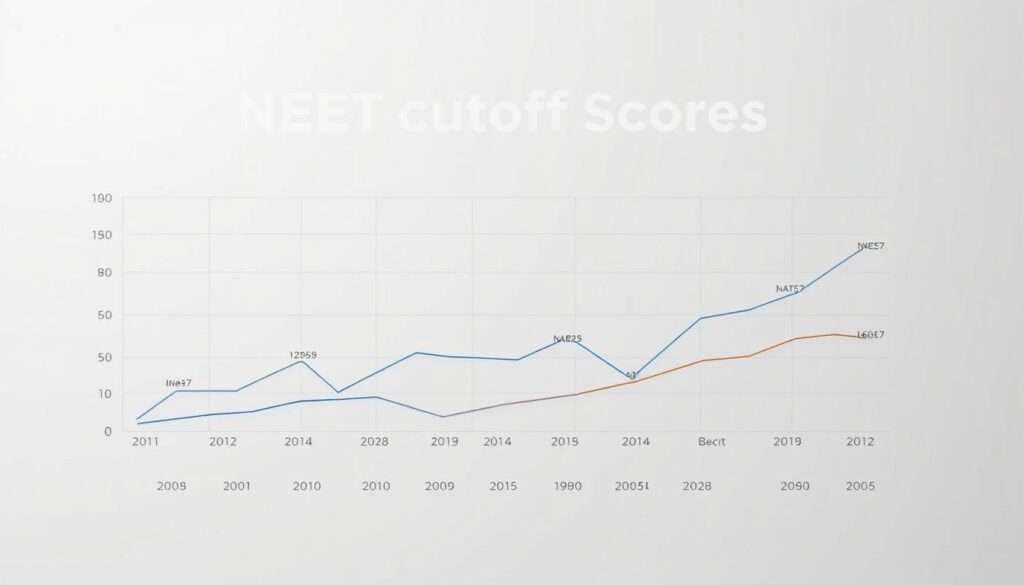Have you ever wondered how long your efforts remain valid for securing a seat in medical colleges? Understanding the timelines and strategies for multiple attempts can make all the difference in your journey.
In India, the validity period is one year, while abroad, it extends to three years. This difference can significantly impact your planning, especially if you’re aiming for international opportunities.
With over 11 lakh candidates qualifying in 2024, it’s crucial to strategize based on category-specific cutoffs. States like Maharashtra saw the highest number of candidates, making competition even more intense.
By aligning your attempts with counselling timelines, you can maximize your chances of success. Let’s dive deeper into how you can make the most of your opportunities.
Understanding NEET Score Validity for MBBS Admissions
Planning your medical education journey requires clarity on how long your results remain applicable. The validity period varies depending on whether you aim to study in India or abroad. This distinction is crucial for aligning your efforts with admission timelines.
Validity Period for Indian Medical Colleges
In India, the results of the entrance test are valid for one year. This means you must take admission within the same academic cycle. For example, if you qualify in 2024, your results will be applicable for the 2024-2025 session.
This one-year window impacts state merit lists, which are typically released in July. Candidates must act swiftly to secure seats in government medical colleges. Missing this timeline means reappearing for the test the following year.
Validity Period for Foreign MBBS Programs
For those aspiring to study abroad, the validity extends to three years. This was formalized by the MCI in March 2019. For instance, if you qualify in 2023, you can apply to foreign universities until June 2026.
This extended period offers flexibility to align with international admission cycles. It also reduces the stress of reappearing annually. Institutions like Lincoln University recognize these results, making it easier to plan your medical career abroad.
Additionally, the three-year window allows time for pre-medical courses or language preparation. This ensures you meet all requirements for a seamless admission process.
How NEET Scores Are Calculated and Evaluated
Understanding how results are calculated can shape your preparation strategy. The process involves a percentile-based system that ensures fairness in ranking candidates. This method considers the performance of all participants to determine cutoffs.
Breakdown of Percentile-Based Cutoffs
The percentile system ranks candidates based on their performance relative to others. For example, a 50th percentile means you scored better than 50% of participants. This approach helps standardize results across different categories.
In 2024, the cutoff for the UR category was set at the 50th percentile, with scores ranging from 720 to 137. For SC/ST/OBC candidates, the cutoff was at the 40th percentile, with scores between 136 and 107. PH candidates had variations, with UR-PH at the 45th percentile.
Category-Wise Score Requirements
Category-specific cutoffs ensure equitable opportunities for all candidates. Here’s a detailed breakdown of the requirements:
| Category | Percentile | Score Range |
|---|---|---|
| UR | 50th | 720-137 |
| SC/ST/OBC | 40th | 136-107 |
| UR-PH | 45th | 136-107 |
The marking scheme awards +4 for correct answers and deducts -1 for incorrect ones. Unattempted questions receive 0 marks. This system encourages accuracy and strategic answering.
In 2024, over 11.45 lakh candidates qualified out of 20.36 lakh applicants. The OBC category saw the highest number of qualifiers, with 5,25,194 candidates. Delhi recorded a qualification rate of 74.92%, showcasing strong performance.
NEET Cutoff Trends: Comparing Past Years
Analyzing past trends helps us understand the evolving dynamics of medical admissions. Over the years, the qualifying percentiles have seen significant changes, reflecting shifts in competition and exam difficulty.

Changes in Qualifying Percentiles (2019-2024)
The cutoff scores for the General category have fluctuated between 720-162 in 2024 and 701-134 in 2019. This six-year comparison highlights the increasing competition among candidates.
For SC/ST/OBC categories, the scores ranged from 161-127 in 2024 to 133-107 in 2019. The 40th percentile cutoff has remained consistent, ensuring equitable opportunities for all.
State-Wise Performance Analysis
Southern states like Tamil Nadu and Kerala have consistently performed well. Tamil Nadu recorded a 48.57% qualification rate, while Kerala maintained a 66%+ performance over the years.
Maharashtra, with a 39.26% qualification rate, and Delhi, at 74.92%, also showed strong results. These state-wise variations emphasize the importance of regional preparation strategies.
Strategies for Maximizing Your NEET Score in Multiple Attempts
Crafting a winning strategy for multiple attempts can significantly boost your chances of success. Whether you’re retaking the exam or preparing for the first time, understanding how to improve is key. Let’s explore actionable steps to enhance your performance.
Analyzing Weaknesses from Previous Attempts
Identifying weak areas is the first step toward improvement. Many candidates struggle with specific subjects or time management. Using NTA’s subject-wise performance analytics can help pinpoint where you need to focus.
For example, if Biology is your weak spot, allocate more time to revising factual content. Similarly, if Physics numericals are challenging, practice solving problems daily. Analyzing past mistakes ensures you don’t repeat them.
Tailoring Study Plans for Improvement
Personalized study plans are essential for retakers. Start by creating a timetable that balances all subjects. Toppers often recommend dedicating 45-50 minutes to Biology, 50-55 minutes to Chemistry, and 60 minutes to Physics daily.
Mock tests are another crucial tool. They help improve speed and accuracy, especially under timed conditions. Case studies, like Prabhanjan J’s method of scoring 720/720, highlight the importance of consistent practice and strategic planning.
| Strategy | Description |
|---|---|
| Time Management | Allocate specific time slots for each subject and stick to them. |
| Mock Tests | Practice with timed tests to simulate exam conditions. |
| Subject Focus | Prioritize weak areas while maintaining strength in others. |
| Retaker Timetable | Use templates designed for multiple attempts to stay organized. |
Additionally, understanding absentee patterns can offer insights. In 2024, 7.15% of candidates were absent, highlighting the need for mental and physical preparation. OCI/NRI candidates, numbering 675 in 2024, also benefit from tailored strategies to meet specific requirements.
By focusing on these strategies, you can turn past challenges into future successes. Every attempt is an opportunity to refine your approach and achieve your goals.
Navigating NEET Counselling for MBBS Seats
Navigating the counselling process for medical admissions can be complex, but understanding the key steps ensures a smoother journey. Whether you’re aiming for a seat through the All India Quota or State Quota, knowing the differences and requirements is essential.
All India Quota vs. State Quota Processes
The All India Quota (AIQ) accounts for 15% of seats in government medical and dental institutes. This quota is open to candidates from all states, making it highly competitive. On the other hand, the State Quota comprises 85% of seats in government medical and dental colleges, reserved for candidates from the respective state.
Here’s a quick comparison of the two processes:
- AIQ: Conducted by the MCC, it includes registration, choice filling, seat allotment, and reporting to the allotted college.
- State Quota: Managed by state authorities, it has separate eligibility criteria and reservation policies.
Key Dates and Documentation
The AIQ counselling for 2024 begins on July 20. It’s crucial to stay updated with the timeline to avoid missing important deadlines. Here’s a checklist of documents required for the counselling process:
- NEET admit card
- Class 10th and 12th mark sheets
- Category certificates (if applicable)
- Photo identity card
- Passport-sized photographs
Understanding the seat allocation mechanics is also vital. AIQ offers 15% of government seats, while State Counselling handles 85%. Deemed universities allocate 100% of their seats through AIQ, and security deposit amounts vary by category.
For top 10% rank holders, special considerations are available, ensuring a streamlined admission process. By staying informed and prepared, you can navigate the counselling process with confidence.
Common Misconceptions About NEET Score Validity
Many students believe that the rules around eligibility are the same everywhere, but this isn’t always true. Understanding these differences can save you from unnecessary stress and setbacks in your medical journey.
One common myth is that the three-year eligibility period applies to private Indian colleges. In reality, private institutions in India require current-year results for admission. This means you must take admission within the same academic cycle to secure a seat.
For those planning to study abroad, the three-year eligibility includes pre-medical courses. For example, Lincoln University allows students to use their results for up to three years, giving them time to complete language or preparatory courses.
Using expired results can have serious consequences. It may lead to disqualification from the admission process, forcing you to retake the exam. Always check the specific requirements of your chosen institution to avoid such issues.
NRI quota candidates often have exceptions. Some universities allow them to use older results, but this varies by institution. Clarify these rules directly with the university to ensure you meet all criteria.
Gap years can also impact eligibility. While the three-year period offers flexibility, it’s essential to plan carefully. Use this time to strengthen your application through additional courses or internships.
By debunking these myths, you can make informed decisions and avoid unnecessary hurdles. Always verify the rules with your target institutions to stay on track.
Conclusion
Planning your medical journey requires understanding both timelines and strategies. Whether you aim to study in India or abroad, the 1-year and 3-year validity periods shape your approach. For multi-attempt candidates, analyzing past performance and tailoring study plans are essential steps.
Keep track of state-wise cutoffs and counselling deadlines to avoid missing opportunities. Verified sources like NMC Guidelines provide reliable information for your planning. With projected registration increases in 2025, staying organized is more important than ever.
Use resources to track state-specific quotas and private college options. By staying informed and prepared, you can maximize your chances to get admission and achieve your medical career goals.




